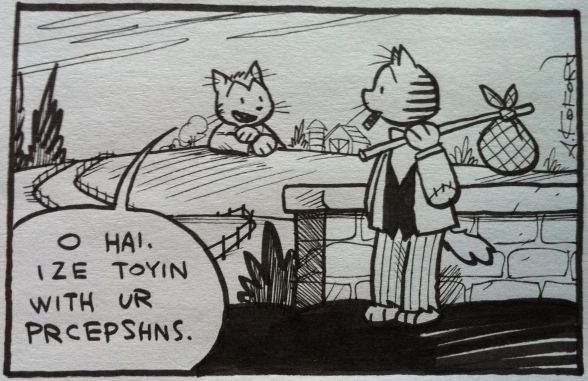Crow Lake, Lawson. No. The writing was perfectly adequate, but the structure of Lawson’s debut novel killed it for me. More specifically, the relentless, detailed, brutal foreshadowing killed it for me. It reminded me of nothing so much as watching a “non-fiction” tv show: “coming up after the break, you’ll meet three new contestants, one of whom wears a leg brace!” Probably because there are characters named Bo and Luke, I gave the foreshadower a Dukes of Hazzard drawl: “Now don’t y’all think that there porkypine’s goin’ t’ give our boys some trouble on down the road?” Lawson settled down toward the middle (having foreshadowed everything, she at least had the decency to tell the story), but then the story itself didn’t merit the elaborate scaffolding she had put around it. If your point is that people are complicated, I need the trip to be substantially more rewarding. This trip is scenic, but ultimately unsatisfying, and the destination is well-trafficked.
Category Archives: Craig’s Book Reviews
The Club Dumas Review
The Club Dumas; Perez-Reverte, tr. Soto. Yes. Translated from Spanish, rather than my more usual French; I imagined sometimes I could tell the difference. Occasionally a bit overwrought, as though it can’t decide whether to be hard-boiled or romantic, but overall lively and engaging.
Lavinia Review
Ithaka Review
The Intuitionist Review
The Intuitionist, Whitehead. No. I wanted very much to like this book, and I did finish it, but it was disappointing throughout. I’m sure my mood wasn’t helped by the fact that apparently random words and passages were circled, underlined, or indicated with marginal notations. It most assuredly didn’t help that Whitehead used “latter” when “last” was called for, and “capitol” for “capital”. Ultimately, though, the book’s downfall was that it was patently speculative fiction (straight science fiction, really—dynamo-punk, perhaps) written by a non-sf writer. Who else would take an interesting speculation and not think about how many other things would change in a world where things had turned out that way?
Gargantua Review
Gargantua; Rabelais, tr. Brown. No. I have frequently run across references to the Rabelaisian sense of humor (well, usually “humour”, in the contexts where I’m running into it), to the point that I thought I should investigate beyond inferring that it’s sesquipedalian for “fart jokes”. I may try again later with a different translation, but I got the distinct impression that this translator was too in love with his own voice to let me hear Rabelais’s.
A Spot of Bother Review
A Spot of Bother, Haddon. Yes. I didn’t enjoy this as much as I enjoyed the Dog in the Night-time. Haddon very nearly overdoes the bother (I recall thinking at one point that if he didn’t settle down, I was going to give up on it), and it’s not clear to me he knew exactly what he wanted to accomplish, but it wasn’t disqualifyingly painful. Sensitive souls may wish to skip to the end of the chapter upon encountering the scissors.
Winds of Marble Arch Review
The Winds of Marble Arch and Other Stories: A Connie Willis Compendium, Willis. Yes. Publishers Weekly calls it brilliant. While a couple of the stories may reach brilliance, most are merely good, with a few very good and some pretty good. I wish the collection included the dates of the stories, so I could tell whether I think she’s getting better or if I just enjoy some of her themes more than others.
D.A. Review
D.A., Willis. Yes. This breezy novella (possibly even a novelette) is a loving hommage to the Heinlein juveniles. Since Willis captures all the charm of those works without the eye-poking, it was quite pleasant.
Always Review
Always, Griffith. Yes. I found myself wanting to recommend this book to almost everyone I know, mostly because different aspects of the book reminded me of many people I know. The only aspect of the writing that I found a bit distracting was Griffith’s ruthless verbal touring. It seems as though she gives the reader every turn as her heroine navigates the city. I may have noticed this more, since I’m relatively familiar with the city, so I may find another of her books with the same heroine set somewhere else, to find whether I experience the same level of distraction.
